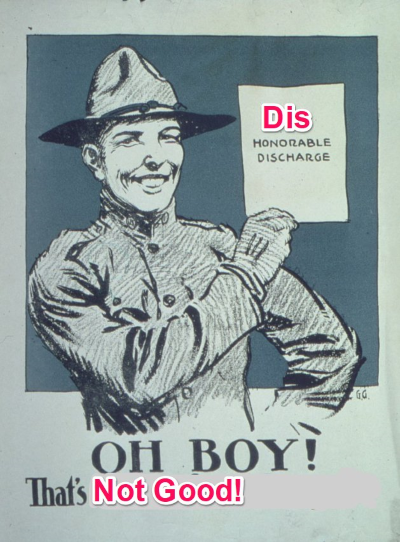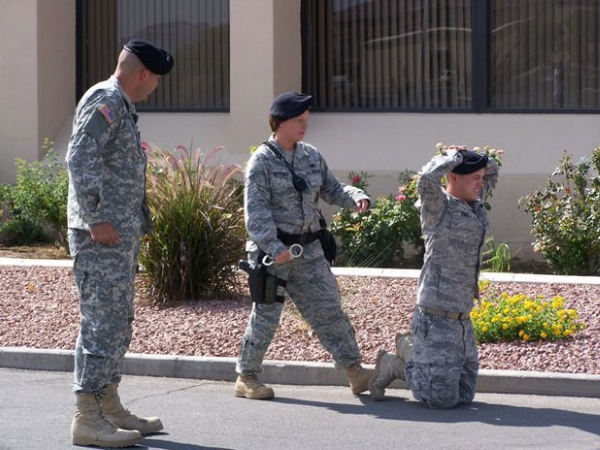When someone is released from their contract to serve in the military and their service has come to an end, they are considered to be discharged.
This is different from a military retirement, although many civilians believe it is the same thing.
There are several different types of military discharge, and the one you receive can have a profound effect on your ability to receive veterans’ benefits or find employment within the government.
Most people will receive an Honorable Discharge or a General Discharge.
An Honorable Discharge is given to those who met or exceeded the standards of conduct during their time in the military, while a General Discharge might be given to someone who fails to perform their duties.
Related Article: 5 Types Of Military Discharge: Benefits (and Consequences) Explained
Some people may even receive an Entry Level Separation (ELS) if someone leaves the military before they’ve completed 180 days of service.
This type of discharge can happen for medical reasons or other circumstances beyond the individual’s control.
It’s neither good nor bad, although it can prevent people from being classified as a veteran for state or military benefits.
Throughout this article, we’ll be talking about all things Dishonorable Discharge.
This includes a full definition of what it is, the reasons why you’d get one, its consequences, and 3 examples of a dishonorable discharge.
Jump To A Section
What Exactly Is A Dishonorable Discharge?

In short, a Dishonorable Discharge is the lowest form of discharge one can receive in the military.
It is a punitive separation that happens as a result of doing something really bad, like rape, desertion, or even murder.
With a Dishonorable Discharge, you forfeit all of the typical benefits you would receive from your military service.
Here’s the longer story:
Basically, a military discharge represents the end of one’s military career.
An Honorable Discharge generally provides you with the benefits that come with being a military veteran, and a General Discharge usually won’t affect any future employment prospects.
However, it is possible to receive a Bad Conduct Discharge if you’ve been given a court martial for bad conduct.
A Bad Conduct Discharge is usually preceded by time in military prison and results in almost all military benefits being forfeited.
As bad as this can be, it is far from the worst type of military discharge someone can receive.
That would be a Dishonorable Discharge, which is considered to be the highest level of punishment that military personnel can receive.
A Dishonorable Discharge is reserved for truly reprehensible crimes such as murder, manslaughter, sexual assault, and desertion.
Those who receive a Dishonorable Discharge will lose all of their military benefits and are forbidden from owning firearms or voting.
They may also find it very difficult to find employment in the civilian sector.
Reasons for a Dishonorable Discharge

There are a few reasons why someone might receive a Dishonorable Discharge, all of which involve crimes that are considered some of the most reprehensible a serviceperson can commit.
For example, a person might be dishonorably discharged if they are Absent Without Leave, or AWOL, for over 30 days.
A person is considered to be AWOL if they intentionally leave their post or fail to return to their post.
Someone may also be dishonorably discharged for sedition, which means they attempted to convince other military personnel to disregard orders or may have even been involved in a plot to overthrow the government.
Murder, Manslaughter, and Sexual Assault
Murder, manslaughter, and sexual assault are also common reasons for a Dishonorable Discharge.
A murder is any intentional action that results in the loss of life, while manslaughter usually involves the unintentional loss of life.
This, of course, does not apply to combat situations when a loss of life would be considered a casualty of war.
Sexual assault can include anything from unwanted touching to rape.
Basically, any unwanted sexual contact that is forced on another individual is considered sexual assault and can result in a Dishonorable Discharge.
Consequences of a Dishonorable Discharge

A Dishonorable Discharge can only be given by general court martial for charges of serious crimes or reprehensible behavior.
It is very serious and considered to be shameful in the military.
Not only does it rightly end one’s military service, but it does not mark the end of an individual’s legal troubles.
Since a Dishonorable Discharge is often the result of a serious felony such as rape and murder, the discharged military member might face a prison sentence, fines, and other serious legal consequences that come with such serious charges.
Long Term Consequences
One of the worst parts about receiving a Dishonorable Discharge is that it can affect your life long after your military service has concluded.
A person who was dishonorably discharged from the military typically cannot receive any of the military benefits that they would otherwise be entitled to.
In fact, a Dishonorable Discharge might even disqualify you from ever receiving government benefits, even those you would normally qualify for based on need.
This means that you may not be able to apply for financial aid if you’re unemployed, and you most likely won’t qualify to receive any bank loans that you may need to purchase a home.
Naturally, all of this would extend to financial aid that might be applied to college tuition, so you would have to pay for any college courses you want to take out of your own pocket.
Not only will you almost certainly be unable to qualify for any government benefits that you would need to survive, but you may have a lot of trouble finding employment with a Dishonorable Discharge on your record.
First of all, you almost certainly will be disqualified from any government jobs.
Employment Consequences

Second, your Dishonorable Discharge will show up on any background checks that potential employers run on you.
This may not disqualify you from finding employment, but many employers look at a Dishonorable Discharge in the same way that they look at a felony conviction.
You might be able to find an employer who will hire you just like an employer might hire someone who was convicted of a felony, but it will make your job search much more difficult.
On top of all of the legal and financial troubles that a Dishonorable Discharge can bring, you will also almost certainly be shunned by other military personnel.
Being part of the United States Military is normally a badge of honor, something that should make anybody proud long after their service is complete.
That won’t happen if you have a Dishonorable Discharge on your record.
You’ll be seen as a criminal, a traitor, or a deserter, depending on the reason for your discharge.
Dishonorable Discharge Examples
We’ve talked a bit about what kind of conduct can result in a Dishonorable Discharge, but let’s talk about some examples.
Case #1 – Bowe Bergdahl
First of all, there is the case of Bowe Bergdahl.
Bergdahl is a soldier who was captured in Afghanistan in 2009 by the Taliban.

Although he was held captive from 2009 to 2014, an investigation into his disappearance uncovered evidence that his capture occurred because he had abandoned his post.
According to some witnesses, Bergdahl may have been drunk when he was ambushed and captured by the enemy.
He was sentenced to a Dishonorable Discharge in 2017, although he won’t face prison time.
Case #2 – Joshua Kruzik
Another particularly heinous example of a Dishonorable Discharge occurred in 2010 when 23-year-old Marine Joshua Kruzik was left to babysit his friend’s 19-month-old daughter.
While the girl was in his care, Kruzik beat her to death.
Not only did he receive a Dishonorable Discharge, but he was sentenced to 25 years to life for second-degree murder and 25 years to life for assaulting a child.
Case #3 – Charles Ng

Another fairly well-known example of a Dishonorable Discharge happened to Charles Ng, a Chinese immigrant who came to the United States with a student visa. Despite not being a United States citizen, he joined the Marine Corps using false documents in 1980.
He was later arrested and charged with stealing heavy weaponry and machine guns from the Marine Corps base in Kaneohe Bay, Hawaii.
He later escaped, so the court martial added attempted desertion to his charges.
He received a Dishonorable Discharge and was sentenced to serve 14 years in Leavenworth Federal Penitentiary.
He only served 18 months thanks to a plea bargain. Ng was later convicted of 11 counts of first-degree murder and sentenced to death in 1999.
He has been labeled a serial killer and is currently on death row in San Quentin prison.
Quick Frequently Asked Questions
What is a dishonorable discharge?
A dishonorable discharge is the lowest form of military discharge one can receive at the end of their military career. In the civilian world, it would be the rough equivalent of being convicted of a felony.
How do you get a dishonorable discharge?
While there are various reasons, the most typical reason one would receive a dishonorable discharge is by committing a reprehensible act. This includes rape, murder, going ‘AWOL,’ and much more.
What happens if you get one?
The consequences of a dishonorable discharge are severe and can result in a prison sentence, affect future employment, and cause a loss of civil rights.
What are the types of military discharge?
The 8 types of military discharge are: Honorable, General, Other Than Honorable, Bad Conduct, Dishonorable, Entry-level separation, Medical Separation, and Separation for Convenience of the Government.
Can I appeal my dishonorable discharge?
While it’s possible, it’s very difficult to do so and can be very costly in terms of time and money.
Conclusion
As you can see, a Dishonorable Discharge is a serious matter that is akin to being convicted of a felony.
It is considered incredibly shameful to other military personnel, and it will impact your ability to receive any financial assistance or find employment.
Since most of the actions that will result in a Dishonorable Discharge are illegal, many military members who do receive a Dishonorable Discharge will also have to face other legal consequences that might include fines and several years in prison.
It’s also a charge that sticks with you for your entire life.
When you enlist in any branch of the United States Military, you are expected to follow the Code of the United States Fighting Force.
This is something that should always make you proud, and rightly so.
On the other hand, there are few things that are more shameful than violating the Code in the most despicable ways possible.
Whether it’s because you leave your post and go AWOL or you commit a violent crime against another human being, a Dishonorable Discharge will ruin your life, your military career, and your reputation.
As with any criminal action that can lead to serious legal consequences, this kind of discharge should be avoided at all costs.
- Replacing Dog Tags: 6 Things You Need to Know - June 28, 2024
- Navy OAR Test Study Guide - June 24, 2024
- 10 Best Sniper Movies of all Time - June 20, 2024
Originally posted on June 17, 2019 @ 2:44 am
Affiliate Disclosure: This post may contain affiliate links. If you click and purchase, I may receive a small commission at no extra cost to you. I only recommend products I have personally vetted. Learn more.

We were told that if you get a dishonorable discharge, you would be given a suit, $25, and a bus ticket home (1976). Has this been changed? i.e. did they up the amount of cash, do you still get a suit or just leave in civilian clothing, and do you still get a ticket home?
From what I understand, getting a Dishonorable Discharge likely means you won’t be going home anytime soon. You have to do something really bad to get one (Murder, Rape, etc.), and in most cases would probably end up in the Brig / prison before they give you a bus ticket.
I had a terrible CO – he was very much a sadist and enjoyed tormenting his troops. He did a surprise barracks inspection on my platoon right after a 16-hour night guard shift. He used a master key to enter my room and started screaming while I lay there asleep. I panicked, jumped out of bed and kicked him in the head, breaking his nose. I was severely injured a few weeks later. He refused to allow me any medical care for a broken neck. When I complained, I was put in for a dishonorable and scrubbed toilets for a few months. I received my honorable but that CO had a friend redact my medical records to hide the accident. I received 100% VA disability, though it took many years. I have a government job with accommodations for my disability. I called my CO once to get a statement about my injuries for the VA. He threatened me saying that he would come to my home and “deal with me”. I found that amusing. He never showed up.